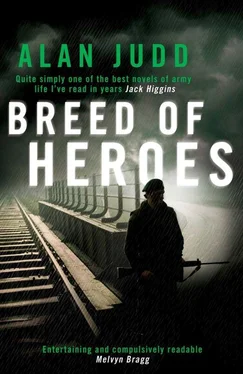‘How about a couple of pints now?’ said Charles. ‘In case I don’t go to the same place.’ The CSM was never a man to turn down an invitation and it soon turned out that Sergeant Wheeler’s depression was not beyond the reach of even canned beer. By the time Charles had gathered his kit and turned with a heavy heart towards Chatsworth and his bunk he had at least accepted his new situation, though he knew it would not be a good one.
Chatsworth was unchanged. Indeed, it was difficult to imagine that he could be Chatsworth and different. It was clear that he had achieved an easy dominance over Moore, whose kit and sleeping space were squeezed into a narrow area just by the sacking that made do as a door so that people who entered when he was there had to step over his head. Tim now shared Edward’s partition. Chatsworth’s famous bunk was a curious and unstable-looking construction of odd bits of wood and canvas, except for the lower bunk that comprised a sheet of corrugated iron. His kit was piled on this and he slept on the canvas top bunk. He was appalled when Charles mentioned the matter of sharing. ‘Who says you’ve got to?’
‘Edward.’
‘Bugger Edward. I made this thing myself. It’s not the Army’s, it’s mine. The bottom bit is a rack for my kit, not a bunk. Who’s he think he is, for Christ’s sake?’
‘Go and ask him if you want but that’s what he said.’ Chatsworth was one of the few people with whom Charles felt he could deal without compunction.
‘There must be somewhere else. What about the roof? It’s mild enough weather and there’s plenty of room.’
‘I’m not sleeping on the roof.’
‘Why not? It’s not bad. You’re not afraid of heights, are you?’
‘You go there if it’s that good.’
Chatsworth took a kick at the absent Moore’s kit. ‘Or Moore’s space. You could use it when he’s not in it.’
‘What about when he is?’
‘He isn’t very often. He’s dopey, he’s asleep on his feet half the time. He probably wouldn’t notice.’
‘And then there’s all my kit, of course.’
‘You’ve got kit?’ Chatsworth’s tone and expression were as near to moral outrage as was possible with him. He put on his belt angrily. ‘Right. I’m going to see Edward. And don’t you go sneaking on to the bunk when my back’s turned.’
The struggle was brief and decisive. Edward’s shouting could be heard above all the other noises of the Factory. Chatsworth returned less than two minutes after setting out, looking like a man most grievously put upon. ‘When I run this army there won’t be room for people like Edward. Dead wood. It’s that that stops us from getting ahead. Mentally unstable too. Not fit to command, in my opinion. D’you know, in the Israeli Army everyone, no matter what rank, has to retire at forty? Good idea, I think. All this balls about having to provide a career till you’re ninety-three — just pay them off, that’s all. Anyway, they wouldn’t all last that long.’ He started moving his kit from the top of the corrugated iron sheet and stowing it on the floor underneath. ‘Well, don’t blame me if the whole thing breaks. It wasn’t designed for brutes like you. And my kit’s going underneath. There won’t be room for yours. You’ll have to find somewhere else.’
Chatsworth’s resentment was the matter of a moment, like most upsets in military life. People endured trouble, misfortune, dressings-down and insults either because they were inevitable or because there was nothing personal in them. It was all a question of form. If you had transgressed you were shouted at or punished in the same way that anyone else would have been in your position, and it was then forgotten. The man who bawled you out one minute would share his water-bottle with you the next. Very soon Charles’s moving into Chatsworth’s bunk was just another fact of life, something to be coped with and thought about no more, rather than the gross violation of territorial integrity it had been at first.
Not that it was without problems. Charles had to pile so much stuff on the corrugated iron, including his sleeping-bag, to act as a mattress thick enough not to conform to the corrugations, that there was very little room between that and the top bunk. Once again, he found himself unable to sit up in bed and compelled to wriggle in and out on his elbows and knees. Every time he or Chatsworth entered or left the bunk, or even when Chatsworth turned over, the whole structure creaked and wobbled. Charles was in constant fear that the top would give way and Chatsworth would come crashing down on him, although most of the time their periods of sleep did not coincide and whoever was trying to sleep would be woken by the other returning. Even when they did coincide Charles’s rest was often interrupted by Chatsworth’s climbing in and out on unexplained personal missions throughout the night. Chatsworth denied a weak bladder or a history of sleep-walking. He even attempted to deny the mysterious missions but in the end conceded that he might very occasionally get up during the night in order to ‘keep an eye on the place’ for the benefit of everyone else. No more could ever be got out of him. Indeed, Charles gave up questioning him altogether after being awoken one night by a painful blow on the side of the head, caused by a Browning which had fallen from beneath Chatsworth’s pillow when he turned over. Angry, and feeling a swelling already forming on his head, Charles had wriggled out and woken Chatsworth, only to see another Browning clatter to the floor when Chatsworth sat up. Chatsworth was unapologetic but did promise to put the Brownings ‘with the others’.
Overall, though, Charles’s new life was only moderately unendurable. He was better off than many people in that he was expected to be in two places — the Factory and the battalion HQ — and so had good reason for not being in either and was accountable to no one. It also meant that he was not really wanted in either place, except for watchkeeping, and so led a largely purposeless and peripatetic existence. There was just over a fortnight to go before the battalion was due to leave, and so the quiet week following his removal to the Factory was very welcome. With every day that passed he felt his chances of survival were better. He saw no journalists and even heard nothing from Beazely, though Van Horne claimed to have taken a call from an incoherent drunk that could have been him. The CO went back to England for five days, Anthony Hamilton-Smith took command and a torpor fell upon Belfast that was every bit as persistent and universal as the rain.
Whether the events of the Sunday that ended the week could have occurred if the CO had been there was a matter for discussion by the more thoughtful for some days afterwards. There was no doubt that his presence would have made a difference, as it did to every occasion, but whether for good or ill it was impossible to say. The fact that all had turned out well could not in all fairness be attributed to Anthony’s being in charge, though it was difficult to imagine them happening in the way they did without him. It would probably have been fairest to describe him as a necessary though not a sufficient condition.
It began at about two in the afternoon with an anonymous telephone call to the RUC which warned of a landmine in a tunnel beneath the Factory. To the RUC, who spent their lives dealing with such matters, this was a run-of-the-mill business that would have to be heeded but which was no cause for real alarm. There were many hoax calls every week and this smelt like one. Edward, however, had spent months worrying about just such a possibility and to him the call was confirmation of his worst fears. He had regarded the first search of tunnels beneath the Factory as almost criminally superficial and had at one time attempted to establish a permanent presence down there. He was thwarted only by not having enough soldiers to go round. With regard to Anthony and others in battalion HQ the warning was something to occupy them on a dreary Sunday, and it was very obviously just this for the local people, who turned out in force to watch the search teams arrive, and the ensuing confusion. Very likely the caller was among them, finding it a better way to pass the time than anything else within the scope of his imagination.
Читать дальше












